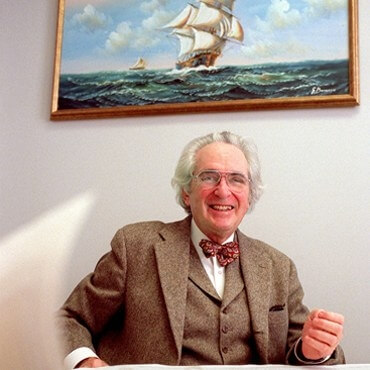News
Allan R. Robinson, Gordon McKay Professor of Geophysical Fluid Dynamics, Emeritus, at the Harvard School of Engineering and Applied Sciences (SEAS) and the Department of Earth and Planetary Sciences (EPS) in the Faculty of Arts and Sciences (FAS) passed away unexpectedly at the age of 76 on September 25, 2009. The cause of death was cardiac arrest.
Described by his family and colleagues as a “deep thinker” and “founding father”, he will be perhaps most remembered, said his close friends, for his “powerful intellect and presence” and his profound influence as a “leader and mentor” to generations of students.
A special 1999 issue of Dynamics of Atmospheres and Oceans honored his profound influence on the field: “Prof. Robinson has set an exceptionally high standard in ocean science. His relentless quest for understanding of the inner workings of the ocean has inspired many students, postdoctoral fellows, and colleagues alike.”
Born in Lynn, Massachusetts on October 17, 1932, Robinson was a pioneer of theoretical and numerical ocean modeling, making major contributions to fundamental physical and interdisciplinary ocean science and dynamics. While a theorist at heart, he led and participated in numerous on-ship explorations to study how his models meshed with the actual currents and properties of the sea. Such experiments led to the first comprehensive view of ocean eddies and their influence on general circulation.
A consummate mentor and teacher, many of his nearly 30 Ph.D. students and 25 postdoctoral fellows now hold leadership positions in the ocean scientific community. He was awarded the Office of Naval Research Distinguished Educator's Award in Ocean Science in 1991.
“Allan was one of the founding fathers of geophysical fluid dynamics,” said Pierre F.J. Lermusiaux, a former student and long-time collaborator of Robinson’s and currently Associate Professor of Mechanical Engineering and Ocean Science and Engineering at MIT. “He was an early leader of fundamental interdisciplinary ocean dynamics, modern ocean predictions and data assimilation. He guided generations of students and research scientists, enabling them to make their own significant contributions. He was driven by a passionate pursuit of quantitative understanding of the sea.”
“His interests were most diverse, from leading the first attempts to predict the ocean circulation to explaining the structure of the large-scale ocean temperature field to the organization of massive international observational field campaigns,” added Eli Tziperman, Pamela and Vasco McCoy, Jr. Professor of Oceanography and Applied Physics at SEAS and EPS.
In particular, his techniques for predicting the weather within the oceans were used extensively during the cold war by the U.S. Navy to track the movement of enemy submarines, especially when they used oceanic features as a form of camouflage. The work evolved into the Harvard Ocean Prediction System, one of the first comprehensive, practical systems used to generate an instant forecast of ocean weather anywhere in the world.
“Allan Robinson's fascination with the ocean was legendary and consuming,” said Paul C. Martin, John Hasbrouck Van Vleck Research Professor of Pure and Applied Physics and former dean of engineering and applied sciences at Harvard. “For more than fifty years, through his research, his teaching, and his governmental advising, he added immensely to understanding of ocean processes and their consequences. He will be missed. The many insights he and his students have contributed live on.”
Robinson who had just completed a major paper before his death, continued to pursue research and travel as an emeritus faculty member. Of particular note was a 2006 collaborative project carried out by his former Harvard team to deploy a fleet of undersea, autonomous robots to observe the ocean in Monterey, California. The study marked the first time such an investigation was done without the aid of humans.
“Allan brought out the best in those he mentored,” said Glenn Flierl, a former student and Professor of Oceanography at MIT. “Not only did he have a wide variety of interesting projects, he could convey the knowledge needed as well as the critical questioning to ensure the work was high-quality. His warmth, support, and nurturing made Harvard a wonderful environment in which to work. Many of us developed a long-term relationship and a friendship with Allan, which makes this loss felt on not just the professional but also the personal level.”
Robinson earned his B.A. (mcl), M.A., and Ph.D. degrees, all in physics from Harvard University and held several honorary degrees, including, Doctor Honoris Causa from the University of Liege, and the Doctor of Science, Honoris Causa from the University of Massachusetts, Dartmouth. He also was a visiting professor or scientist at Woods Hole Oceanographic Institution; Cambridge University; Imperial College (London); and the Indian Institute of Sciences (Bangalore).
In addition to his research roles, he served on national and international advisory committees, including the Ocean Sciences and Naval Studies Boards of the National Research Council and chaired programs and working groups for international cooperative science, playing a leadership role in efforts such as MODE (Mid-Ocean Dynamics Experiment), POLYMODE (Polygon Mid-Ocean Dynamics Experiment), and POEM (Physical Oceanography of the Eastern Mediterranean).
He authored and edited more than a hundred and fifty research articles and books, serving as editor-in-chief of the prestigious series of treatises, The Sea, and of the journal, Dynamics of Atmospheres and Oceans. He was a Fellow of the American Academy of Arts and Sciences, the American Association for the Advancement of Science, and the American Geophysical Union. He was a recipient of “The Award for the Merits of Two Worlds” given by the Robert Schuman European Institute of Cultural Integration.
Robinson is survived by his wife, Marguerite whom he met when he was a junior at Harvard and she a freshman at Radcliffe College and by their three daughters, Sarah Penelope Robinson, Perrine Robinson-Geller, and Laura Ondine Robinson, and by six grandchildren; and by his sister Gladys Meltzer.
A memorial service will be held at Harvard in the spring.
Cutting-edge science delivered direct to your inbox.
Join the Harvard SEAS mailing list.
